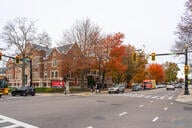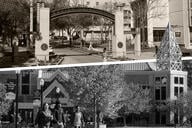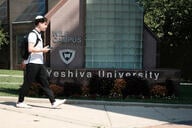You have /5 articles left.
Sign up for a free account or log in.
WASHINGTON -- What accusation about Roman Catholic colleges is most likely to worry parents and bishops alike?
How about the charge that they make their Catholic students less Catholic? That's the assertion regularly made by the Cardinal Newman Society, based in part on a 2003 analysis called: "Are Catholic Colleges Leading Students Astray?" The society -- a self-appointed watchdog group on Catholic colleges' fealty to church teachings -- reported findings that generated nationwide news coverage: "[G]raduating seniors are predominantly pro-abortion, approve of homosexual 'marriage,' and only occasionally pray or attend religious services. Nine percent of Catholic students abandon their faith before graduation."
On Sunday, new research was released here at the annual meeting of the Association of Catholic Colleges and Universities that challenges many of the assumptions of the 2003 report. The new study doesn't dispute that many Catholic students at Catholic colleges disagree with some church teachings, especially those on abortion and gay marriage. But by asking a different question -- did Catholic students move closer to or further away from church teachings during their time at college? -- the new analysis suggests that Catholic colleges are not the heresy-producers they are accused of being.
The research finds that Catholic students at Catholic colleges are less likely than Catholic students at other colleges to move away from the church and more likely to turn toward it. Further, the study finds that the Catholic students at Catholic colleges -- while moving away from the church on some issues -- more toward the church on others, including both political and philosophical views and specific actions, such as the reading of sacred texts.
Over all, the study finds that Catholic students "remain profoundly connected to their faith" as they progress in college.
Given that the charges raised by critics of the colleges regularly create controversies at Catholic colleges, the data could be significant. Richard A. Yanikoski, president of the Association of Catholic Colleges and Universities, said that the comparisons to non-Catholic institutions are important because this is an era in which college-age students are willing to question faith regardless of their faith and where they go to college. The new research shows, he said, that "a typical Catholic undergraduate student attending a Catholic college or university emerges more spiritually intact than if she or he had attended a public or secular private institution, but not nearly as spiritually active as would have been the case a few decades ago."
The new study was conducted by the Center for Applied Research in the Apostolate, at Georgetown University. Like the Cardinal Newman research, the new study relied on national surveys of student attitudes -- as they enter college and a few years later -- conducted by the Higher Education Research Institute, at the University of California at Los Angeles.
Attitudes of Catholic Students, by Type of College
| Issue/Institution Type | Away From Church | Unchanged | Toward Church | Net Change (in % Points) |
| Abortion | ||||
| --Catholic college | 31% | 53% | 16% | -15 |
| --Public college | 36% | 47% | 17% | -19 |
| --Private religious (non-Catholic) | 33% | 53% | 14% | -19 |
| --Private non-sectarian | 35% | 47% | 18% | -17 |
| Commitment to reducing pain and suffering in world | ||||
| --Catholic college | 15% | 47% | 38% | +23 |
| --Public college | 18% | 42% | 40% | +22 |
| --Private religious (non-Catholic) | 18% | 48% | 35% | +17 |
| --Private non-sectarian | 21% | 38% | 41% | +20 |
| Cutting military spending | ||||
| --Catholic college | 17% | 46% | 37% | +20 |
| --Public college | 23% | 45% | 32% | +9 |
| --Private religious (non-Catholic) | 18% | 45% | 37% | +19 |
| --Private non-sectarian | 12% | 45% | 43% | +31 |
| Attitudes on same-sex marriage | ||||
| --Catholic college | 39% | 45% | 16% | -23 |
| --Public college | 42% | 43% | 15% | -27 |
| --Private religious (non-Catholic) | 36% | 50% | 14% | -22 |
| --Private non-sectarian | 42% | 44% | 14% | -28 |
The research also examined data on specific religious behaviors. Here, the study finds that Catholic students at Catholic colleges do move away from some (but not all) practices, but that the movement is greater at other types of institutions.
Religious Behavior of Catholic Students, by Type of College
| Behavior | Less Active | Unchanged | More Active | Net Change (in % Points) |
| Mass attendance | ||||
| --Catholic college | 32% | 61% | 7% | -25 |
| --Public college | 42% | 50% | 8% | -34 |
| --Private religious (non-Catholic) | 51% | 44% | 4% | -47 |
| --Private non-sectarian | 49% | 45% | 7% | -41 |
| Prayer | ||||
| --Catholic college | 29% | 45% | 26% | -3 |
| --Public college | 34% | 42% | 23% | -11 |
| --Private religious (non-Catholic) | 31% | 45% | 23% | -8 |
| --Private non-sectarian | 40% | 38% | 21% | -19 |
| Reading sacred texts | ||||
| --Catholic college | 28% | 42% | 30% | +2 |
| --Public college | 33% | 49% | 18% | -15 |
| --Private religious (non-Catholic) | 32% | 39% | 29% | -3 |
| --Private non-sectarian | 32% | 44% | 24% | -8 |
Yanikoski acknowledged that the data don't suggest some kind of "magical" transformation at Catholic colleges that would run counter to all other societal trends. Catholic students at Catholic colleges are more likely to decrease mass attendance than increase it, and so forth. But he said that the figures show that this movement away from religion is less likely at a Catholic than a non-Catholic college. And he added that one has to factor in what goes on to all people in their late teens and early 20s.
"The trajectory of faith, relative to when they were younger, is downward," he said, and that's true of all students (and Catholics who don't attend college). That being the case, he said that the smaller drops in adherence to religious practice or beliefs at Catholic colleges (and gains in some cases) reflect the positive work taking place at the colleges to connect students to their faith.
That's not to say, he added, that leaders of Catholic colleges don't want to see more from students, but in "young adulthood, what parent is happy with everything in the state of the minds of their kids? This is when young adults are pushing back against authority."
Generally, he said that the "more nuanced" analysis prepared by the Georgetown researchers should be helpful to member institutions.
While the report notes that there may be issues of "self-selection" in that Catholic students who care about their faith may be more likely to attend Catholic colleges, Yanikowski said that this wasn't a serious limitation of the study. Most Catholic students who select Catholic colleges do so for reasons other than the religious nature of the institution, he said, which also explains the high non-Catholic enrollments at the colleges. In this context, he said that he believes the self-selection factor is minimal.
Patrick J. Reilly, president of the Cardinal Newman Society, said that he had not seen the new study, but that he was not impressed with the ideas in it that were described to him. "If the ACCU thinks it appropriate to celebrate the fact that Catholics lose their faith somewhat slower at Catholic colleges than elsewhere then they can hardly represent the concerns of faithful Catholic families."
He said that he has wanted ACCU and other groups to do more research to build on the Cardinal Newman Society's work, so he was pleased to see the association's interest. But he said the association seemed to want to "ignore" the "serious problems" the society has publicized. Reily said it wasn't good enough for Catholic colleges to say that they have success with Catholic students on some issues but not others. At Catholic colleges, he said, "students should be inspired to embrace and deepen their Catholic faith, not negotiate around Catholic moral teaching."




